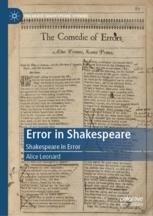Error in Shakespeare: Shakespeare in error
 The traditional view of Shakespeare’s mastery of the English language is alive and well today. This is an effect of the eighteenth-century canonisation of his works, and subsequently Shakespeare has come to be perceived as the owner of the vernacular. These entrenched attitudes prevent us from seeing the actual substance of the text, and the various types of error that it contains and even constitute it. This book argues that we need to attend to error to interpret Shakespeare’s disputed material text, political-dramatic interventions and famous literariness. The consequences of ignoring error are especially significant in the study of Shakespeare, as he mobilises the rebellious, marginal, and digressive potential of error in the creation of literary drama.
The traditional view of Shakespeare’s mastery of the English language is alive and well today. This is an effect of the eighteenth-century canonisation of his works, and subsequently Shakespeare has come to be perceived as the owner of the vernacular. These entrenched attitudes prevent us from seeing the actual substance of the text, and the various types of error that it contains and even constitute it. This book argues that we need to attend to error to interpret Shakespeare’s disputed material text, political-dramatic interventions and famous literariness. The consequences of ignoring error are especially significant in the study of Shakespeare, as he mobilises the rebellious, marginal, and digressive potential of error in the creation of literary drama.
zum Buch im ULB-Katalog
zum Buch auf der Verlags-Website
Perceptions of Germany in British travel literature
 As part of the “beaten track”, Germany did not conform to the Grand Tourist ideals of eighteenth-century British travellers that were influenced by the spirit of the Enlightenment, and, therefore, sought to trace vestiges of the Greco-Roman cultural tradition in their ventures across the continent. It was not until the end of the eighteenth century that the German landscape becomes the central theme of British travel discourse, marking the gradual shift of focus from the “saturated” image of classical Greece to the rediscovery of the Old Germanic culture of the sagas.
As part of the “beaten track”, Germany did not conform to the Grand Tourist ideals of eighteenth-century British travellers that were influenced by the spirit of the Enlightenment, and, therefore, sought to trace vestiges of the Greco-Roman cultural tradition in their ventures across the continent. It was not until the end of the eighteenth century that the German landscape becomes the central theme of British travel discourse, marking the gradual shift of focus from the “saturated” image of classical Greece to the rediscovery of the Old Germanic culture of the sagas.
Driven by an antiquarian interest in the German context, British travellers discovered Germany in the wake of the nineteenth century, when the dissolution of the Holy Roman Empire not only signalled French expansionism in Protestant Europe, but also stimulated the appetite of the Victorians for the exploration of the German culture in an attempt to define themselves as being of pure Teutonic stock. Given the strenuous struggle of German thinkers to deal with the feelings of humiliation and shame caused by the Napoleonic rule, and, in view of a potential Gallicisation, nineteenth-century Germans mastered the fields of comparative philology and Northern antiquarianism to transform their political weakness into a new cultural paradigm that not only fostered pan-Germanism through the rediscovery of the folk tales and legends of their medieval tradition, but also ascribed to Germany a superior spiritual role, which was later incorporated into the racial discourses of Germany and Britain.
This book is concerned with the views of British travel writers, focusing on travel narratives produced from 1794 until 1845. As such, it sheds light on instances which pertain to the representation of Germanness in relation to the British national context.
zum Buch im ULB-Katalog
zum Buch auf der Verlags-Website
Weitere Titel können Sie in unseren Neuerwerbungslisten für die Anglistik entdecken!
